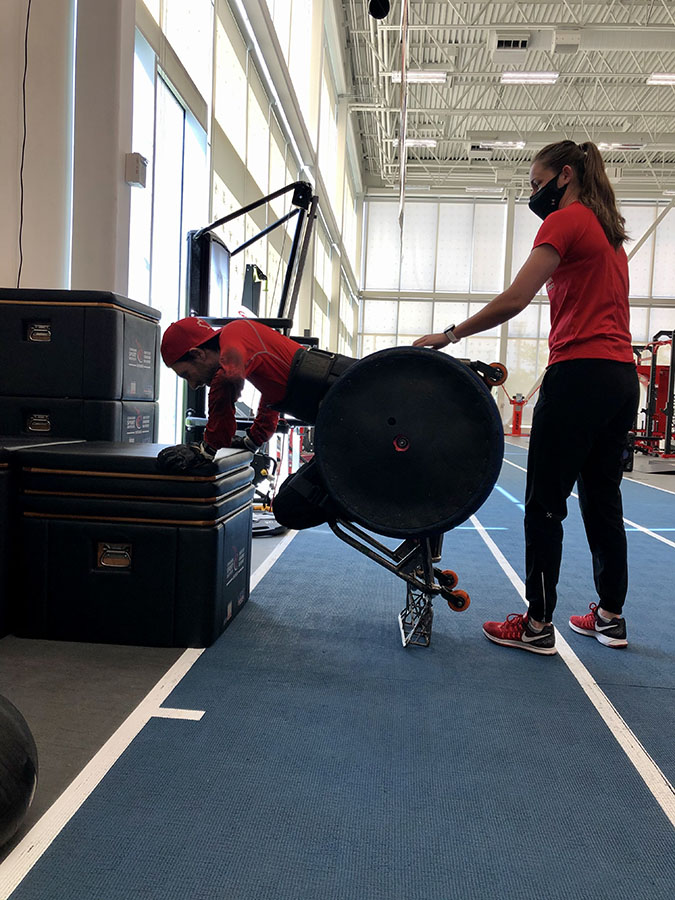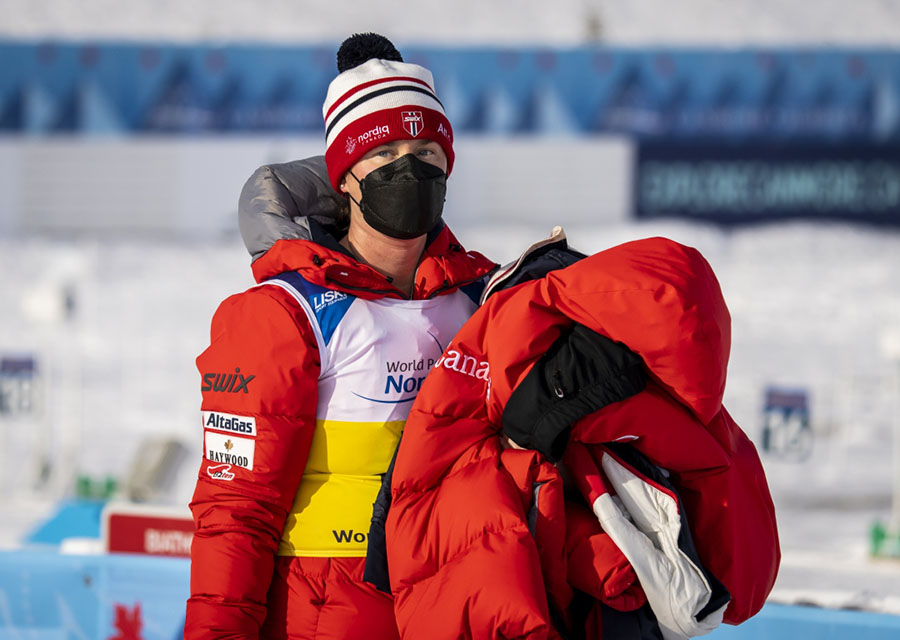WECAN Win with Science

When there is little available research to gain understanding of a particular issue — say thermoregulation impairment from a spinal cord injury — what do you do?
In the case of para sport, it turns out, you do a lot.
It’s not until you start learning more about para sport that you begin to gain an appreciation for the added layers of complexity and extra challenges faced by para-athletes and the practitioners that support them.
One of the major hurdles is the dearth of scientific literature, especially compared with extensive research in able-bodied sport. This is important because para-athletes don’t always respond to a given stimulus the way an able-bodied athlete would.
A key reason for this lack of research is due to fewer athletes and very few homogeneous groups of athletes within a sport.
“It’s hard to publish research in para sport,” explains Melissa Lacroix, Exercise Physiologist at Canadian Sport Institute Ontario (CSIO) and physiologist for Canada’s Wheelchair Rugby Team. “Within a given sport not everyone has the same impairment and much of what exists are case studies or ‘one-off’s’ that are hard to publish or apply to specific situations.”

For an Integrated Support Team (IST) in para sport, the result is doing the best with what you’ve got. But in Canada, it also means doing more. No science? We’ll do the science!
To address gaps in para sport, Own the Podium (OTP), in partnership with the Canadian Olympic and Paralympic Sport Institute (COPSI) Network and Sport Scientist Canada, established the Paralympic Sport Professional Development Working Group approximately 2-years ago. The group, which includes Lacroix, creates opportunities for practitioners in para sport to learn more about specific physiological considerations for para-athletes.
Initially, the group created an education module with an applied perspective, but after conducting surveys they learned that there was a deep hunger amongst practitioners, coaches and administrators for more information and knowledge about the physiology that underpins how different impairments affect para-athletes.
This is where doing the science comes in. To help fill that need, the group wrote a review paper that was recently published in Frontiers in Rehabilitation Sciences titled, “Physiological Considerations to Support Podium Performance in Para-Athletes.”
The paper outlines the neurophysiology of the most common impairment groups and the practical considerations when supporting para-athletes, along with performance enhancing interventions.

One of the six authors of the paper is Erica Gavel, a retired Paralympian in Wheelchair Basketball, and PhD Candidate at Ontario Tech University. With a unique perspective as both an athlete and researcher in para sport, Gavel says that a lot of learning has to happen for practitioners in para sport to make good, performance-based decisions. “This paper gives the practitioner enough information for them to be able to dig deeper into a specific topic.”
Digging deeper is tough to do when there isn’t much out there to dig for, something Gavel acknowledges is a major challenge. To further address these gaps, Lacroix says the working group helps practitioners share what they know. “There is not a lot of data available, so we had to create more collaboration across Canada and lean on practitioners to share their knowledge and experience.”
For IST practitioners, access to data and information is improving thanks to slowly-increasing published research. One such practitioner is Jess Kryski, IST Lead and Physiologist for Canada’s Para Nordic Team and physiologist at Canadian Sport Institute Calgary (CSIC), who welcomes more para-specific research.
“Often we are looking at research using able-bodied endurance athletes and then, with knowledge of various impairments, ensuring that we are implementing monitoring to achieve the training effect we are looking for with different training interventions,” explains Kryski.
With advances in para sport research, Kryski and her team won’t have to rely on able-bodied science to make the best possible decisions about training and performance. Lacroix says that the tools and baseline levels used in able-bodied research don’t always apply to para-athletes because their impairments change how their bodies respond to different interventions.

For now, Kryski says the most important thing is to stay current with the literature that is out there and how it may apply to the athletes she works with. “Do the study participants have similar impairments? And are the interventions applicable to our sport, sport demands, and the type of training that is done for endurance sport?” she asks.
The answers come in the form of new research, sharing of knowledge by practitioners across the country and an individual approach to each athlete’s needs.
For example, in her role IST role as a Physiologist for Wheelchair Rugby, Lacroix focuses mostly on applied physiology, but she still aims to collect evidence and publish her research as much as possible. This evidence can be shared and applied to other athletes with similar impairments, as long as the channels of collaboration are wide open.
In what was a truly national, cooperative effort between OTP, the COPSI Network, and the Network’s expert practitioners on ISTs across many para sports, the end result is the advancement of para sport research, and a foundation of sound science to make evidence-based decisions supporting Canada’s para-athletes in their pursuit of the podium.
But there is still so much work to be done.
Jess Kryski, no doubt an expert in her field, still has a lot of questions. “A really key area that I would like to see more research done in Para Nordic Skiing is on equipment and technique based on different impairments,” she says. “There is so much done in this area for able-bodied skiers.”
Challenge issued. Any takers?
Written by: Kristina Groves
Photos: Dave Holland / CSI Ontario
About the Canadian Sport Institute Calgary
The Canadian Sport Institute Calgary provides world-class training environments in Alberta. With the support of our partners, we deliver leading sport science and medicine, coach education and life services to help Canada's high-performance athletes achieve Olympic and Paralympic podium performances. www.csialberta.ca
-30-
Media Contact:
Annie Gagnon, Director, Marketing & Communications
Canadian Sport Institute Calgary
c: 613.262.9644
e: This email address is being protected from spambots. You need JavaScript enabled to view it.
Annie Goncin, Manager, Athlete Services & Digital Media
Canadian Sport Institute Calgary
c: 647.767.6862
e: This email address is being protected from spambots. You need JavaScript enabled to view it.
